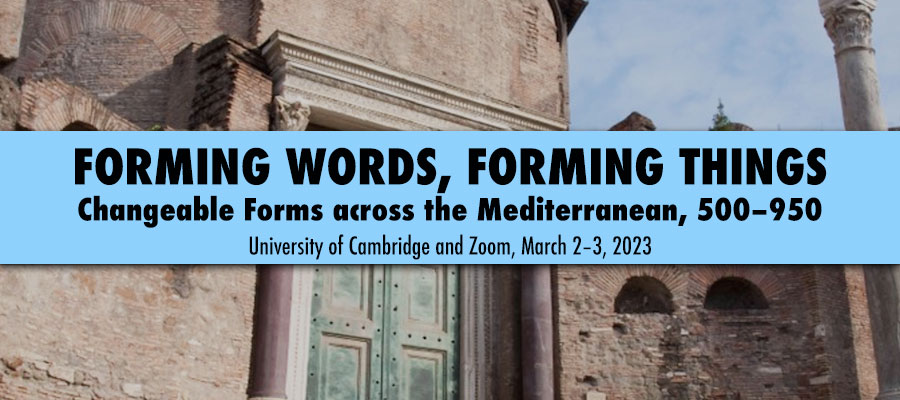Forming Words, Forming Things: Changeable Forms across the Mediterranean, 500–950, University of Cambridge and Zoom, March 2–3, 2023
From 500 to 950 CE, the Mediterranean witnessed extensive political, religious, and demographic shifts which allowed for new modes of interaction. As a result, populations gained access to and developed previously unfamiliar written and material forms. Deviations from what we view as typical uses of form can help us understand the dynamics and impact of demographic change, but the characterisation of what made a form ‘typical’ in the first place is questionable.
This conference aims to question the limits and flexibility of written and material form. We invite papers which discuss use of form and challenge our perspectives and assumptions regarding form from 500 to 950 CE. The conference will ask why a certain form is available to one person and not to another, and to what extent societal markers of identity impact one’s use of and access to poetic, prosaic, and artistic forms. What happens when these boundaries and our understanding of them are transgressed? Are certain forms afforded more flexibility in practice?
The first day of the conference will address the questions above in a panel format and the second day will be in a workshop format with pre-circulated discussion papers. The workshop aims to question our scholarly engagement with the sixth to tenth century. There is a tendency to see form as static: if a literary form moves from one language to another, for instance, it is assumed stable at the point of origin. Yet many of these boundaries are constructed and projected by modern scholars in attempts to categorise. Who defines the terms on which a form may be used and how is a form made exclusionary? How are these boundaries created in and across varied disciplines?
We invite abstracts for papers of 15 to 20 minutes and for workshop papers of 3000 to 6000 words. Graduate students and early career researchers (within four years of receiving a PhD and without a permanent position) are welcome to apply. We especially encourage those working on topics which cross multiple boundaries to apply, along with those working on North Africa and West Asia.
Potential topics include, but are not limited to:
- Peculiarities of form across spatial and linguistic boundaries
- Form and representation, particularly of underrepresented groups in the source material
- Popularisation of form and barriers to access
- The impact of physical movement and transport of materials on form
- The use of the same or a similar form in two or more languages or geographic locations
- Critical or theoretical writing from the sixth to tenth century which attempts to define a form
- Modern scholarly efforts to understand and define form
